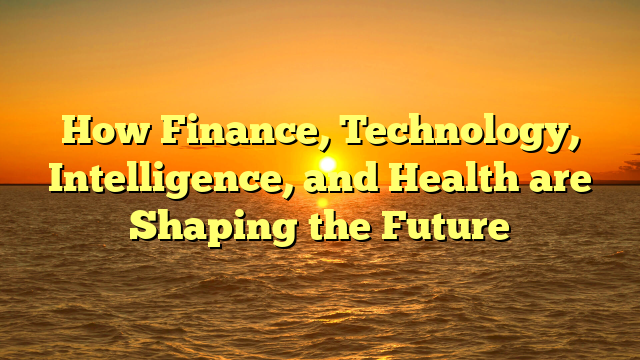—
In today’s rapidly evolving world, the interconnectedness of finance, technology, artificial intelligence, and health has become more apparent than ever. These fields are not only reshaping how we live and work but also paving the way for innovative solutions to some of society’s most pressing challenges. This article explores how each of these areas is evolving and the impact they are having on individuals, businesses, and the global economy.
—
Finance: Shaping the Future of Wealth
Finance has entered an era of transformation driven by blockchain, cryptocurrency, and the rise of digital currencies. Innovations such as decentralized finance (DeFi) and AI-powered tools are making financial systems more efficient, secure, and inclusive. Blockchain technology is not only revolutionizing payment systems but also reshaping the way financial data is processed and stored.
The role of artificial intelligence (AI) in finance is also gaining prominence. AI algorithms are used for data analysis, risk management, and predictive modeling, allowing investors and financial institutions to make more informed decisions. Robo-advisors, for example, have gained popularity for offering automated investment strategies, making financial planning accessible to a wider audience. With the growing integration of AI, the future of finance is poised for even greater automation and personalized financial services.
—
Technology: Accelerating Change in Every Sector
Technology is undeniably at the heart of nearly every industry, from healthcare to finance and education. slot thailand of AI, machine learning, and robotics is revolutionizing industries and creating new opportunities for businesses to optimize their operations. The increasing reliance on cloud computing and the Internet of Things (IoT) is also paving the way for smarter and more interconnected systems.
The rise of AI and automation is enhancing the way businesses handle tasks that were previously time-consuming or labor-intensive. With AI-driven analytics, companies can process vast amounts of data to improve decision-making, forecast trends, and identify opportunities for growth. This has led to a shift toward more intelligent systems in areas like customer service, product development, and market research.
—
The Evolution of Intelligence: From AI to Human-like Cognition
Artificial intelligence (AI) and machine learning have come to the forefront as powerful tools in solving complex problems across various fields. From healthcare to finance and manufacturing, AI is playing a central role in optimizing operations, making predictions, and enhancing the quality of products and services. The future of AI looks even more promising, with advancements in neural networks, NLP, and cognitive computing that could lead to more human-like intelligence.
Cognitive computing, a branch of AI, is specifically designed to simulate the human thought process. With applications in precision medicine, education, and business, cognitive computing is helping organizations make smarter decisions. For example, in healthcare, AI is enabling faster diagnoses, personalized treatments, and better patient care by analyzing medical data and predicting outcomes.
—
How Technology is Revolutionizing Healthcare
The healthcare industry has seen tremendous advancements in recent years, thanks to the intersection of technology and health. AI-powered tools are now being used for everything from disease diagnosis to drug discovery. Machine learning models can analyze medical data faster and more accurately than humans, leading to more timely interventions and better outcomes. Additionally, wearable technology has empowered individuals to monitor their health in real time, leading to greater personal accountability and early detection of potential health issues.
AI is also transforming the field of personalized medicine by analyzing large datasets to identify patterns and correlations. These insights are helping doctors tailor treatments to individual patients, improving effectiveness and reducing side effects. As AI evolves, it will play an even greater role in the development of new therapies and vaccines, improving public health globally.
—
Ultimately, the integration of finance, technology, intelligence, and health is driving monumental shifts in how we live and work. These fields are complementing each other, creating a more interconnected and innovative world. The ongoing developments in AI, automation, and digital technologies will continue to shape the future, offering vast potential for improving financial systems, technological infrastructure, intelligence capabilities, and healthcare delivery.
